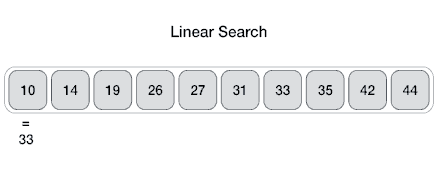线性搜索

From Wikipedia: linear search or sequential search is a method for finding a target value within a list. It sequentially checks each element of the list for the target value until a match is found or until all the elements have been searched. Linear search runs in at worst linear time and makes at most n comparisons, where n is the length of the list.
Properties
- Worst case performance O(n)
- Best case performance O(1)
- Average case performance O(n)
- Worst case space complexity O(1) iterative
#![allow(unused)] fn main() { use std::cmp::PartialEq; pub fn linear_search<T: PartialEq>(item: &T, arr: &[T]) -> Option<usize> { for (i, data) in arr.iter().enumerate() { if item == data { return Some(i); } } None } #[cfg(test)] mod tests { use super::*; #[test] fn search_strings() { let index = linear_search(&"a", &vec!["a", "b", "c", "d", "google", "zoo"]); assert_eq!(index, Some(0)); } #[test] fn search_ints() { let index = linear_search(&4, &vec![1, 2, 3, 4]); assert_eq!(index, Some(3)); let index = linear_search(&3, &vec![1, 2, 3, 4]); assert_eq!(index, Some(2)); let index = linear_search(&2, &vec![1, 2, 3, 4]); assert_eq!(index, Some(1)); let index = linear_search(&1, &vec![1, 2, 3, 4]); assert_eq!(index, Some(0)); } #[test] fn not_found() { let index = linear_search(&5, &vec![1, 2, 3, 4]); assert_eq!(index, None); } #[test] fn empty() { let index = linear_search(&1, &vec![]); assert_eq!(index, None); } } }